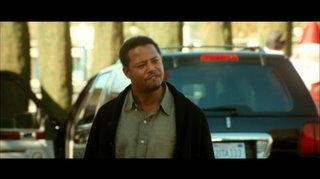Crash: Calm the fuck down! [DVD note]
 (I sent Foundas the letter but don't have an address for Dargis.)
(I sent Foundas the letter but don't have an address for Dargis.)Open letter to Manohla Dargis:
I value the thoughtfulness of your work, so please trust that I write out of respect, but I thought one of your descriptions of Crash was reprehensibly stupid: "a movie that says sometimes black men really are muggers (so don't worry about racial profiling)". I'm not crazy about the film, but I find this tremendously unfair to Paul Haggis and co.
After Sandra Bullock's pro-profiling speech, Haggis repeatedly hits his audience over the head to drum in that such thinking is wrong. Bullock accuses Michael Pena of gang membership, though he turns out to be a snuggly teddy bear of a family man. Ryan Phillippe subconsciously profiles Larenz Tate and is rewarded by becoming a murderer. You're right to label Crash a vehicle for Angeleno self-acclamation (your point on the city's segregation is well-taken). But to disparage it as merely a means for the upwardly mobile to assuage their guilt over the people they've stepped on or just blotted out of their lives is blind: this viewpoint requires you to ignore how hard Haggis is trying to teach us a lesson.
Open letter to Scott Foundas:
I have no doubt that Crash is a failure, but I take issue with your assertion that its flaws are not just artistic but moral. It's bad enough that you have it both ways by calling it a "liberal jerk-off" and then tainting it by association with the Bush adminstration. But I take particular issue with where you reduce the characters to "whatever stereotype they're on hand to embody and/or debunk". The opposition you set up is misleading: can even one of the major characters simply be dismissed as a stereotype? Are our screens really so full of erudite carjackers? Of sympathetic racists? Of any kind of Iranian-Americans? You would be right in suggesting that each character exists primarily to debunk stereotypes. Isn't this a laudable goal?
You can certainly argue with Haggis's methods (letting the racist care deeply for his father is interesting, having him save the life of the woman he molested is insulting), but it won't do to present your reader's idiotically glib assertion "that people are afraid to admit they don't like Crash for fear of being considered racists themelves" when the whole theme of the picture is that everyone can be racist -- for any reasonably honest person to like the movie, they've got to own up to their personal prejuduces. (It would be unfair, but marginally less glib, to say that people who don't like Crash are refusing to admit to their own racism.) And while I don't think the African-American Film Critics Association is representative of anyone besides themselves, surely it's a cheap shot to imply they're psychologically enslaved because they like this movie. Couldn't it just be that they're thankful to see Terrence Howard and Don Cheadle in roles more morally complex than good guy/bad guy?
I do enjoy reading you and look forward to continuing to do so in the decades to come.
Open letter to everyone else:
What I haven't mentioned above is that Ludacris is hilarious in his role. The joke is that he of all people is shooting off on use of the N-word; it's the screwiest twist to hip hop morality since Dr. Dre pretended to be Eminem's conscience.
B PLUS

0 Comments:
Post a Comment
<< Home